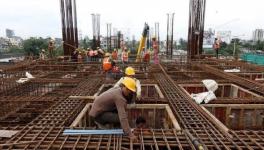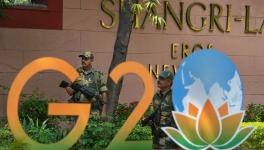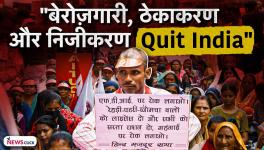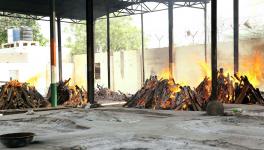COVID-19: Gurugram Workers Continue to Struggle with Hunger and Distress, Govt Relief Inadequate
Representational Image.
Hunger continues to plague the lives of informal workers living in Gurugram, pointed out a report compiled by the Gurugram Nagrik Ekta Manch (GNEM), a civil society initiative that has been providing an average of 350 ration kits per day since March 27, the third day of the lockdown, and about 25,000 cooked meals everyday since April 4, 2020. Additionally, GNEM also responds to SOS calls and requests telephonically, consolidating and sharing data about demands with the administration and other civil society groups on a daily basis.
The organisation used time series data from their own operation to compile this report, which points out that despite the hard work of many organisations and individuals, the hunger crisis has not abated yet, and substantial gaps remain between demand and supply of food. The report says, “A number of early signs were missed and the government’s response has lagged behind the stark reality of distress. A much stronger and coordinated response is required.”
According to GNEM, hunger distress in Gurugram started increasing when the lockdown was extended from April 15, and the distress calls received by the organisation went up from an average of nine calls per day during the first 21 days of the lockdown, to 60 a day. Lockdown extension created panic among those with no income, negligible savings and rising debt.
The report said, “The rate of demand for dry rations and cooked food has consistently outstripped supply since the start of the lockdown. Even with nearly 10,100 ration kits delivered until 21 April, which provided food security for 40,400 people, GNEM has only been able to cater to 68% of those in need. GNEM has served close to 4 lakh cooked meals since the first week of April but is still only able to meet 74% of demand.”
Also read: Government Abandons the Poor: NGOs, Activists Struggle to Feed Them
It was pointed out that even though the state administration meticulously mapped out the COVID-19 hotspots, the attention paid to the hunger hotspots was not nearly enough. It said, “Hunger hotspots like Dundahera, Sarhol, Naharpur, Manesar, Laxman Vihar, Nathupur and Khandsa emerged clearly in our data. These were not specifically and systematically targeted by the administration for food relief, even while COVID hotspots were systematically tracked.”
Most of the calls received by GNEM indicated anxiety over food for several reasons. Most of the workers have little or no savings, and the extension of the lockdown until May 3 created panic among the workers and insecurity about where the next round of rations will come from, and when. With the extension of the lockdown, the line of credit with the local general stores were snapped, “bringing a fresh set of people who were not asking for rations before also into the vulnerable and needy category”. The report said, “Those without a locally registered ration card had no support from the government, nor was there any cash support schemes in place.”
Despite the Ministry of Labour’s orders that all workers should be “deemed to be at work” during the lockdown period, a recently released report by Stranded Workers Action Network (SWAN) shows that more than 85% of workers employed as casual labour at construction sites, in factories as well as domestic help in Gurugram have not been paid their wages or at best been paid partially. A total of 89% of the workers that made SOS calls had not been paid by their employers.
Of 50 formal sector workers surveyed on April 15 in Manesar by Safe in India, 37% had not received their salaries for the month of March. GNEM said, “The distress, therefore, is not restricted to informal workers. The government’s lack of success in intervening with employers is adding additional pressure on the already fragile and fragmented relief ecosystem.”
GNEM made several recommendations to the government, urging it to make the entire system of ration coupon distribution public, re-open registration for Rs 1,000 cash relief to daily wagers, and ensure that the employers pay wages. It also asked the government to institute bi-weekly consultations with civil society groups, set up a single helpline for Gurugram, and set up a public grievance portal.
Get the latest reports & analysis with people's perspective on Protests, movements & deep analytical videos, discussions of the current affairs in your Telegram app. Subscribe to NewsClick's Telegram channel & get Real-Time updates on stories, as they get published on our website.
























